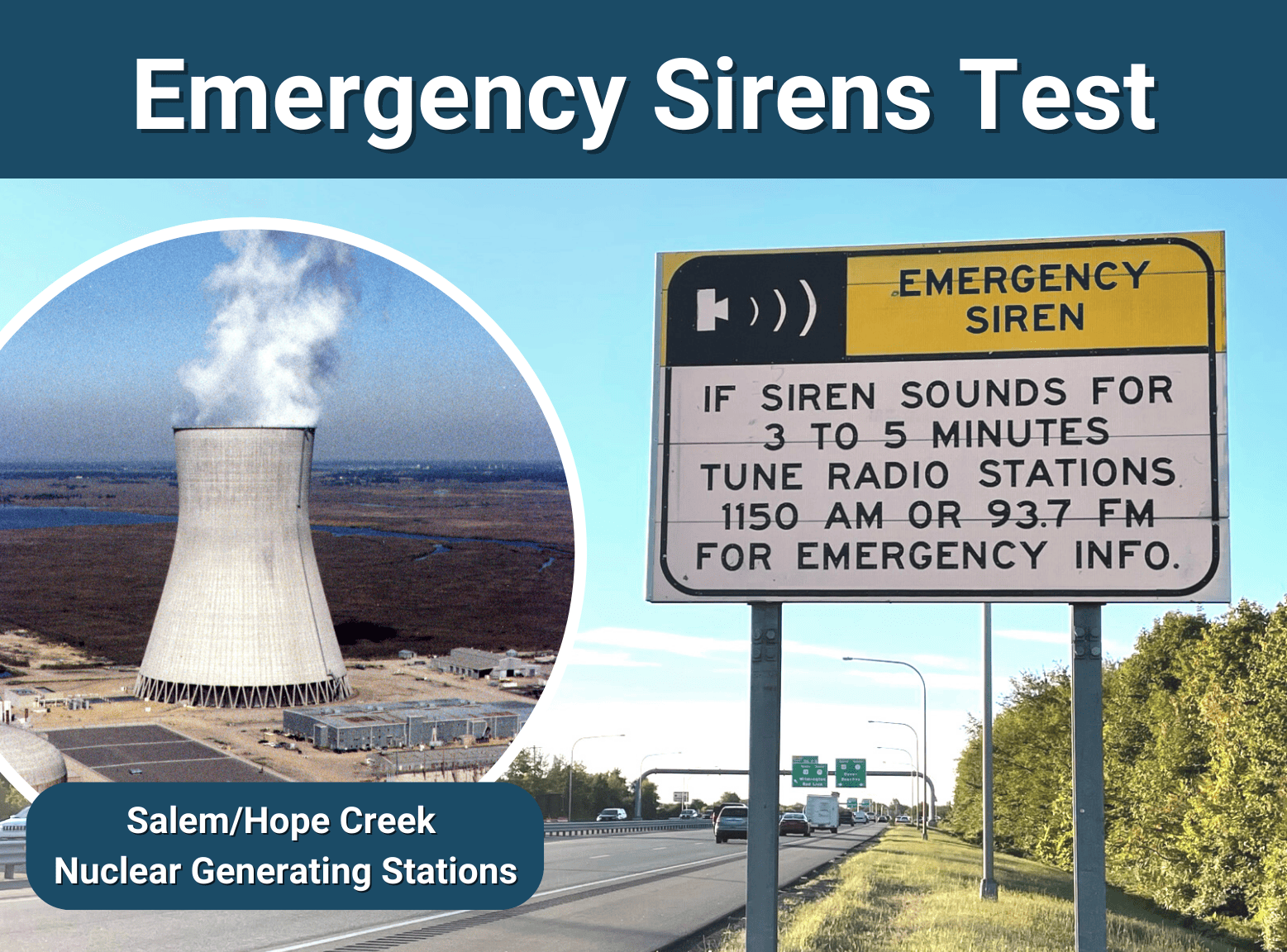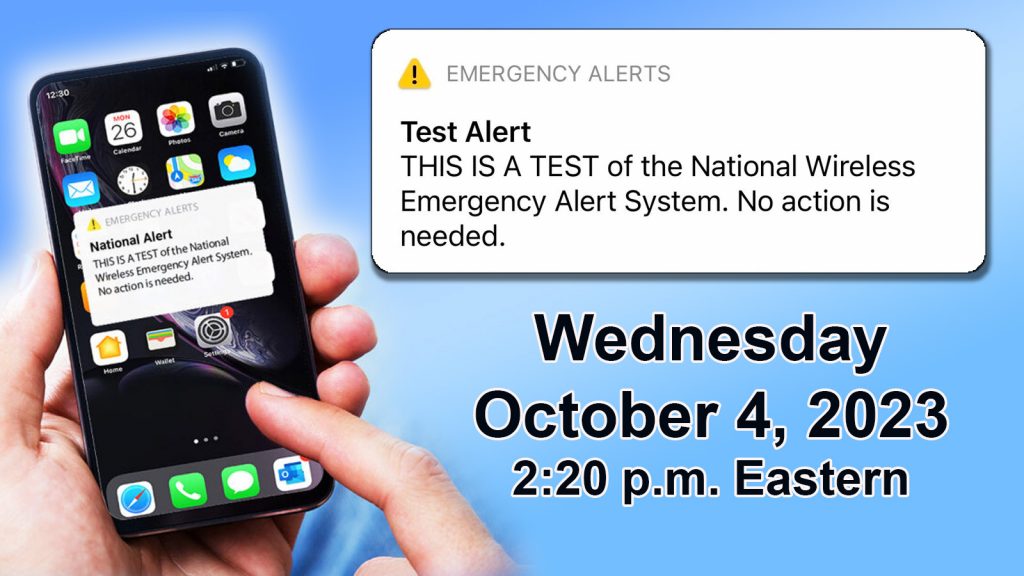October Events: Siren Test, National Alert Test, and Potassium Iodide Distribution
Delaware Emergency Management Agency | Department of Safety and Homeland Security | News | Date Posted: Tuesday, September 26, 2023
Delaware Emergency Management Agency | Department of Safety and Homeland Security | News | Date Posted: Tuesday, September 26, 2023

SMYRNA, Del. – On Tuesday, October 3, at 10:45 a.m., the Delaware Emergency Management Agency (DEMA), Delaware State Police, and the Public Service Enterprise Group Inc. (PSEG), will conduct a regular quarterly test of the Salem/Hope Creek Nuclear Generating Stations Alert and Notification system.
Sirens will be activated for three to five minutes, followed by a test message of the Emergency Alert System (EAS) on local radio stations. Sirens tested are the same ones used to alert the public in the event of an actual emergency. There are 37 sirens in Delaware located within a 10-mile radius of the Salem-Hope Creek Generating Stations in New Jersey. The sirens cover an area north from Delaware City, west to Middletown, and south to Woodland Beach. This test is part of an ongoing program that continually monitors the integrity of the siren system.
In the event of an actual emergency, there would be a series of steady three (3) to five (5) minute siren sounds that would alert citizens to turn their radio to an Emergency Alert System (EAS) station for critical emergency information or instructions.
For more information, please call the Delaware Emergency Management Agency at 1-877-SAY-DEMA
(1-877-729-3362) or (302) 659-3362 and ask for Georgina Harris-Sharper or Albert Samah.

The scheduled test on October 4 will reach millions of mobile phones across the country via Wireless Emergency Alerts (WEA), radio and television via the Emergency Alert System (EAS), and other communication pathways. The test will take place around 2:20 p.m. ET on Wednesday, October 4, 2023. Backup testing is October 11.
The national test will help ensure that Wireless Emergency Alerts (WEA) and the Emergency Alert System (EAS) continue to be effective ways to warn the public about emergencies, particularly those on the national level. All major U.S. wireless providers participate in Wireless Emergency Alerts and will transmit the national test to their subscribers.
If your mobile phone is on and within range of an active cell tower from a participating wireless provider, you should receive the national test. Wireless providers will transmit the national test for 30 minutes, but your phone should only receive it once.

The Delaware Emergency Management Agency (DEMA) and Delaware Division of Public Health (DPH) will distribute free potassium iodide (KI) tablets to those who live or work within the 10-mile of the Salem/Hope Creek Nuclear Generating Stations in New Jersey radius (also known as the Emergency Planning Zone or EPZ). The free tablets will be distributed on Thursday, October 5, between 11 a.m. and 7 p.m. at the Townsend Fire Company, 107 Main Street, Townsend, Delaware.
KI is available to residents who have received it previously and whose tablets have reached their expiration date, as well as those who never received tablets before. Individuals with home or business addresses within the EPZ are eligible to receive the KI tablets. Recipients must bring a photo ID such as a driver’s license, proof of residency such as a utility bill, or proof of employment within the EPZ when they go to the Townsend Fire Company—this is the only requirement to receive KI tablets. Residents who have KI that is expired can bring those tablets to the distribution center to exchange for new ones.
KI does not protect against external radiation but can help protect the thyroid gland from ingested or inhaled radioactive iodine that might be released in a radiation emergency. KI is one of the protective measures outlined in Delaware’s emergency plans developed for use in a nuclear incident. The State of Delaware receives the tablets through a program initiated by the U.S. Nuclear Regulatory Commission (NRC).
Delaware residents living outside of the 10-mile EPZ who would like to obtain KI tablets should contact their pharmacist. KI is also available over the counter at some local pharmacies.
The 10-mile EPZ in Delaware is comprised of four Emergency Response Planning Areas (ERPAs):
For additional information regarding the potassium iodide distribution program in Delaware, call the Delaware Emergency Management Agency (DEMA) Radiological Emergency Preparedness (REP) section at 302-659-3362. More information and resources can be found at PrepareDE.org.
New for 2023:
2023-2024 Emergency Plan Information for NJ and DE (PSEG Calendar) with up-to-date info and resources.
The Delaware Emergency Management Agency (DEMA) is the lead state agency for coordination of comprehensive emergency preparedness, training, response, recovery, and mitigation services to save lives, protect Delaware’s economic base and reduce the impact of emergencies. DEMA is a division within the Department of Safety and Homeland Security (DSHS) and authorized by Delaware Code.
Social Media: Delaware Emergency Management Agency on Facebook and X and Instagram
Keep up to date by receiving a daily digest email, around noon, of current news release posts from state agencies on news.delaware.gov.
Here you can subscribe to future news updates.
Delaware Emergency Management Agency | Department of Safety and Homeland Security | News | Date Posted: Tuesday, September 26, 2023

SMYRNA, Del. – On Tuesday, October 3, at 10:45 a.m., the Delaware Emergency Management Agency (DEMA), Delaware State Police, and the Public Service Enterprise Group Inc. (PSEG), will conduct a regular quarterly test of the Salem/Hope Creek Nuclear Generating Stations Alert and Notification system.
Sirens will be activated for three to five minutes, followed by a test message of the Emergency Alert System (EAS) on local radio stations. Sirens tested are the same ones used to alert the public in the event of an actual emergency. There are 37 sirens in Delaware located within a 10-mile radius of the Salem-Hope Creek Generating Stations in New Jersey. The sirens cover an area north from Delaware City, west to Middletown, and south to Woodland Beach. This test is part of an ongoing program that continually monitors the integrity of the siren system.
In the event of an actual emergency, there would be a series of steady three (3) to five (5) minute siren sounds that would alert citizens to turn their radio to an Emergency Alert System (EAS) station for critical emergency information or instructions.
For more information, please call the Delaware Emergency Management Agency at 1-877-SAY-DEMA
(1-877-729-3362) or (302) 659-3362 and ask for Georgina Harris-Sharper or Albert Samah.

The scheduled test on October 4 will reach millions of mobile phones across the country via Wireless Emergency Alerts (WEA), radio and television via the Emergency Alert System (EAS), and other communication pathways. The test will take place around 2:20 p.m. ET on Wednesday, October 4, 2023. Backup testing is October 11.
The national test will help ensure that Wireless Emergency Alerts (WEA) and the Emergency Alert System (EAS) continue to be effective ways to warn the public about emergencies, particularly those on the national level. All major U.S. wireless providers participate in Wireless Emergency Alerts and will transmit the national test to their subscribers.
If your mobile phone is on and within range of an active cell tower from a participating wireless provider, you should receive the national test. Wireless providers will transmit the national test for 30 minutes, but your phone should only receive it once.

The Delaware Emergency Management Agency (DEMA) and Delaware Division of Public Health (DPH) will distribute free potassium iodide (KI) tablets to those who live or work within the 10-mile of the Salem/Hope Creek Nuclear Generating Stations in New Jersey radius (also known as the Emergency Planning Zone or EPZ). The free tablets will be distributed on Thursday, October 5, between 11 a.m. and 7 p.m. at the Townsend Fire Company, 107 Main Street, Townsend, Delaware.
KI is available to residents who have received it previously and whose tablets have reached their expiration date, as well as those who never received tablets before. Individuals with home or business addresses within the EPZ are eligible to receive the KI tablets. Recipients must bring a photo ID such as a driver’s license, proof of residency such as a utility bill, or proof of employment within the EPZ when they go to the Townsend Fire Company—this is the only requirement to receive KI tablets. Residents who have KI that is expired can bring those tablets to the distribution center to exchange for new ones.
KI does not protect against external radiation but can help protect the thyroid gland from ingested or inhaled radioactive iodine that might be released in a radiation emergency. KI is one of the protective measures outlined in Delaware’s emergency plans developed for use in a nuclear incident. The State of Delaware receives the tablets through a program initiated by the U.S. Nuclear Regulatory Commission (NRC).
Delaware residents living outside of the 10-mile EPZ who would like to obtain KI tablets should contact their pharmacist. KI is also available over the counter at some local pharmacies.
The 10-mile EPZ in Delaware is comprised of four Emergency Response Planning Areas (ERPAs):
For additional information regarding the potassium iodide distribution program in Delaware, call the Delaware Emergency Management Agency (DEMA) Radiological Emergency Preparedness (REP) section at 302-659-3362. More information and resources can be found at PrepareDE.org.
New for 2023:
2023-2024 Emergency Plan Information for NJ and DE (PSEG Calendar) with up-to-date info and resources.
The Delaware Emergency Management Agency (DEMA) is the lead state agency for coordination of comprehensive emergency preparedness, training, response, recovery, and mitigation services to save lives, protect Delaware’s economic base and reduce the impact of emergencies. DEMA is a division within the Department of Safety and Homeland Security (DSHS) and authorized by Delaware Code.
Social Media: Delaware Emergency Management Agency on Facebook and X and Instagram
Keep up to date by receiving a daily digest email, around noon, of current news release posts from state agencies on news.delaware.gov.
Here you can subscribe to future news updates.